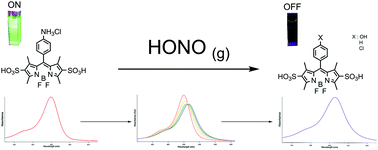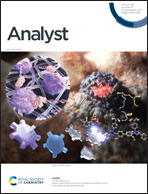A boron dipyrromethene (BODIPY) based probe for selective passive sampling of atmospheric nitrous acid (HONO) indoors†
Abstract
People spend up to 90% of their time indoors, and yet our understanding of indoor air quality and the chemical processes driving it are poorly understood, despite levels of key pollutants typically being higher indoors compared to outdoors. Nitrous acid (HONO) is a species that drives these indoor chemical processes, with potentially detrimental health effects. In this work, a BODIPY-based probe was synthesized with the aim of developing the first selective passive sampler for atmospheric HONO. Our probe and its products are easily detected by UV-Vis spectroscopy with molar extinct coefficients of 37 863 and 33 787 M−1 cm−1, respectively, and a detection limit of 14.8 ng mL−1. When protonated, the probe fluoresces with a quantum yield of 33%, which is turned off upon reaction. The synthesized BODIPY probe was characterized using NMR and UV-Vis spectroscopy. Products were characterized by UV-Vis and ultra high-resolution mass spectrometry. The reaction kinetics of the probe with nitrite was studied using UV-Vis spectroscopy, which had a pseudo-first-order rate of k = 7.7 × 10−4 s−1. The rapid reaction makes this probe suitable for targeted ambient sampling of HONO. This was investigated through a proof-of-concept experiment with gaseous HONO produced by a custom high-purity calibration source delivering the sample to the BODIPY probe in an acidic aqueous solution in clean air and a real indoor air matrix. The probe showed quantitative uptake of HONO in both cases to form the same products observed from reaction with nitrite, with no indication of interferences from ambient NO or NO2. The chemical and physical characteristics of the probe therefore make it ideal for use in passive samplers for selective sampling of HONO from the atmosphere.



 Please wait while we load your content...
Please wait while we load your content...